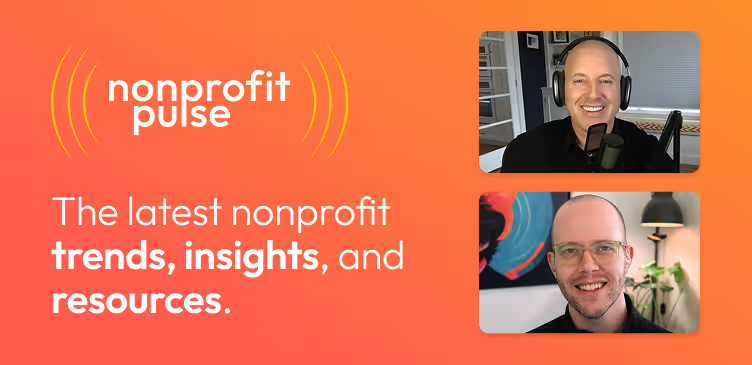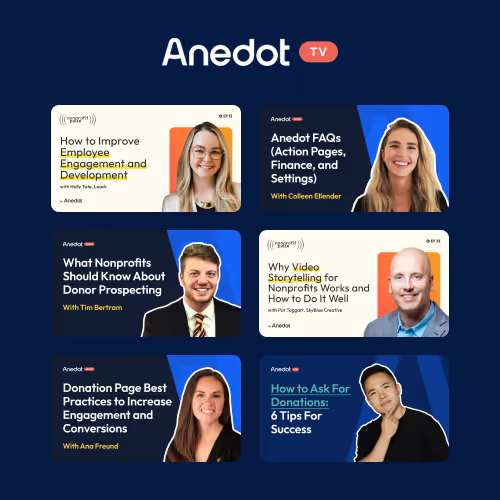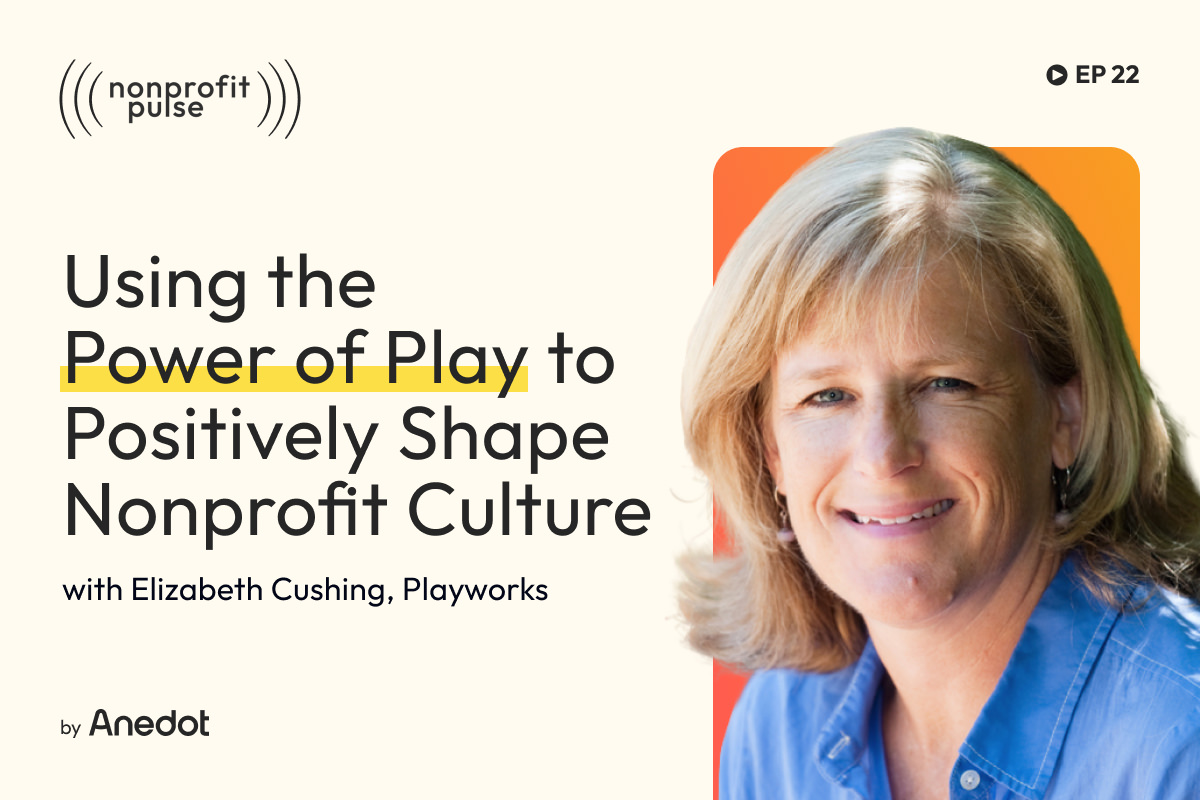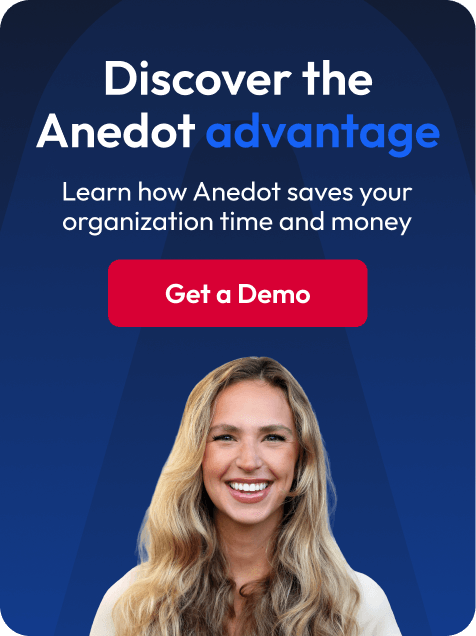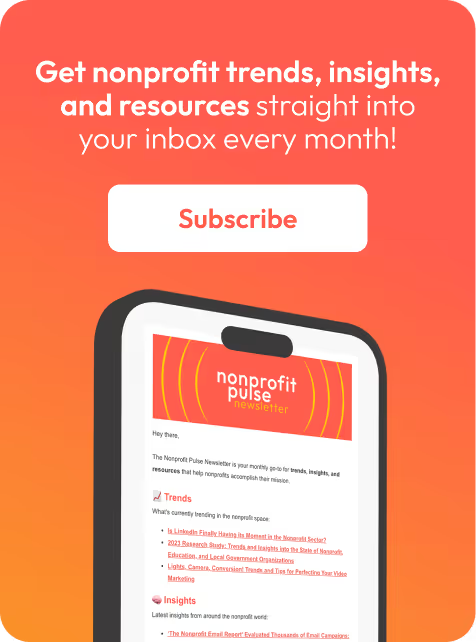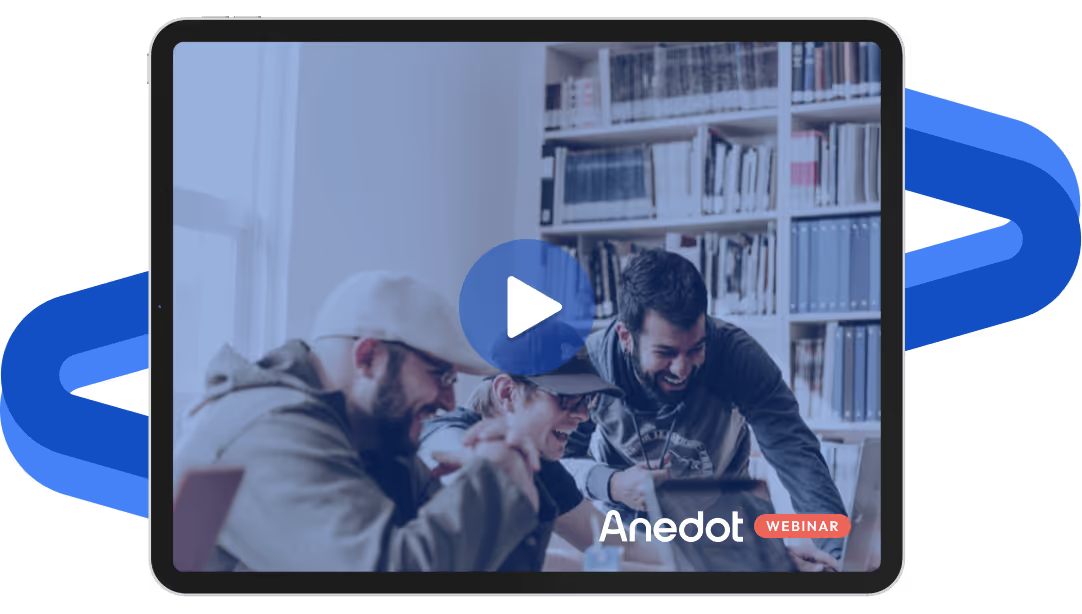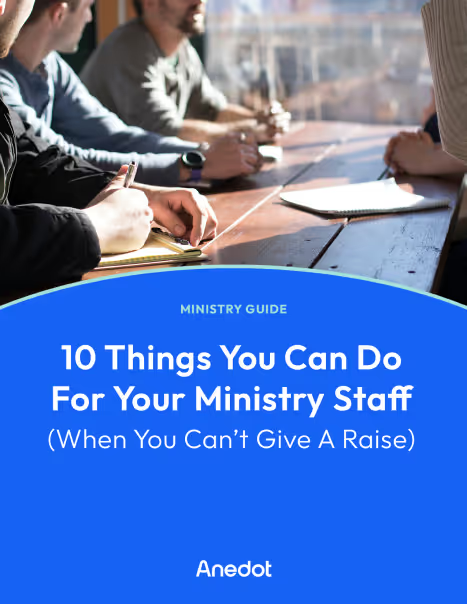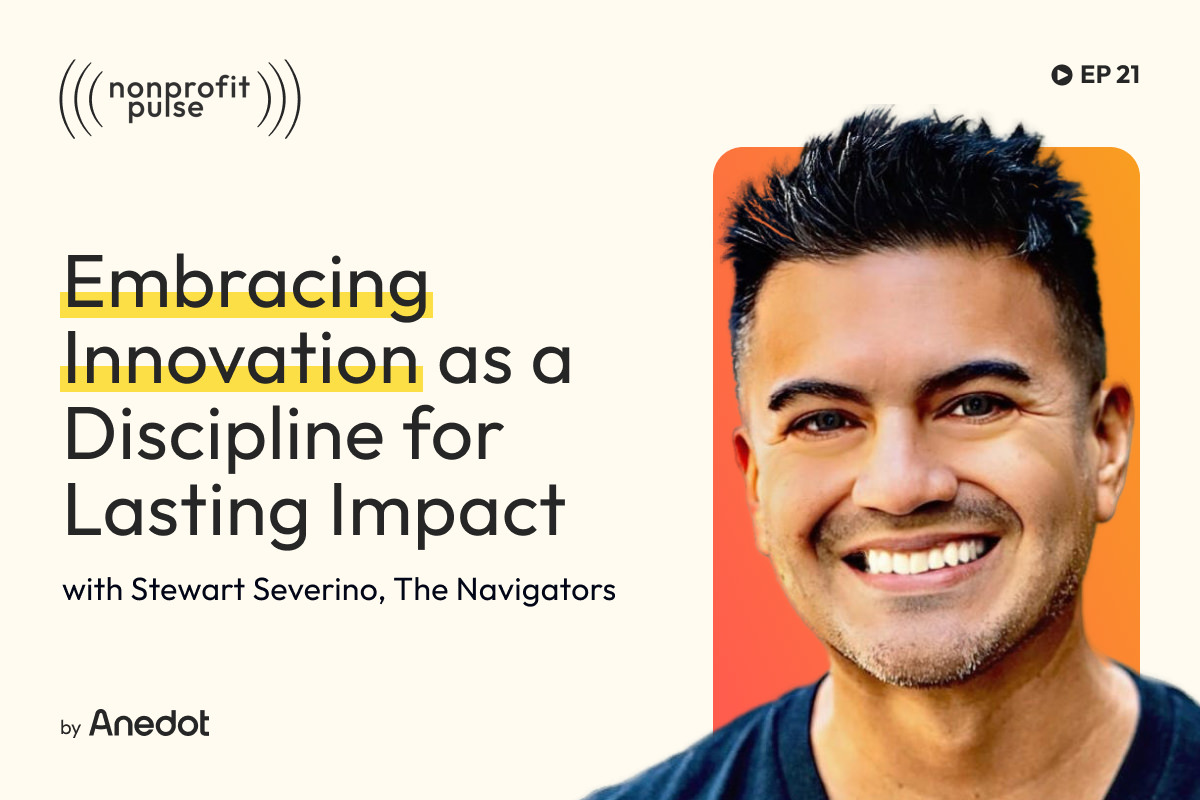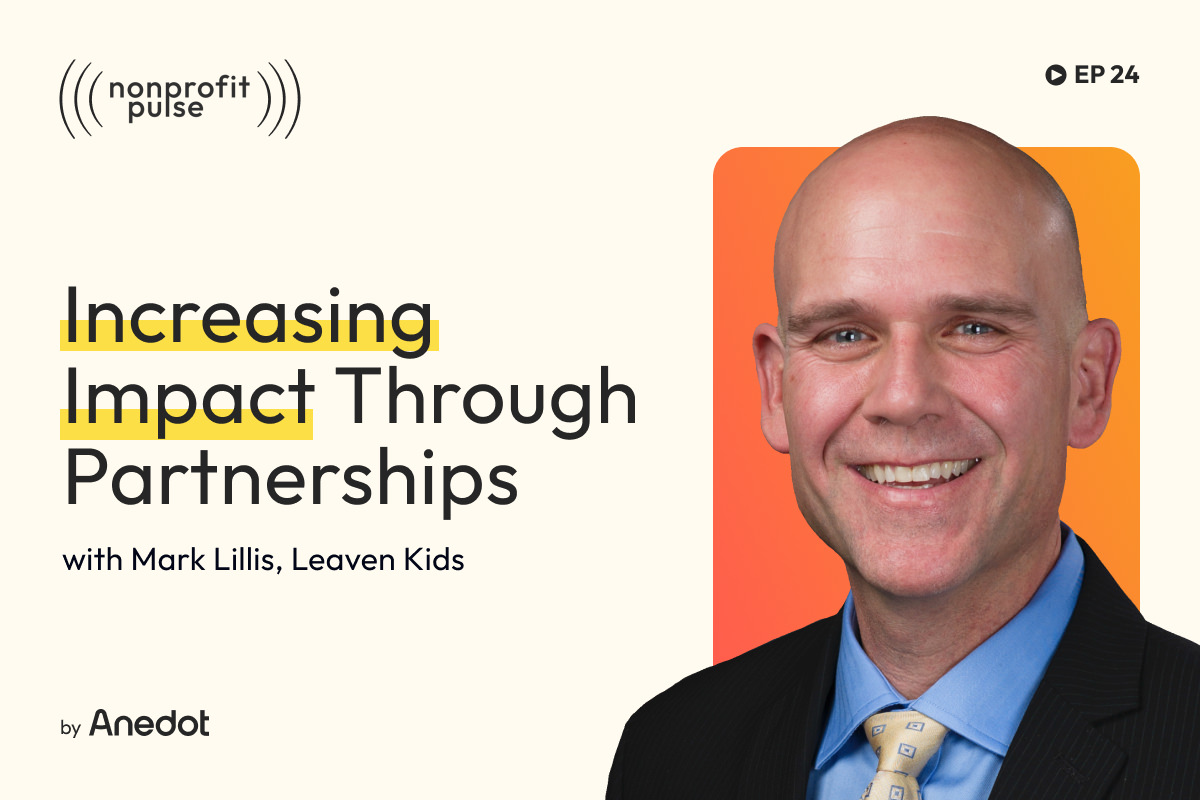Podcast episode transcript ↓
Josh:
Utilizing play is an effective tool to connect with people, and is a powerful way to build a healthy and vibrant nonprofit culture.
When nonprofits incorporate play into their culture, they can boost creativity, improve morale, and drive productivity and innovation.
So, how can nonprofits get started with implementing play into their culture, and what impact could this shift have on their overall mission and success?
I’m Josh with Anedot, and welcome to Nonprofit Pulse where we explore trends, insights, and resources that help nonprofits accomplish their mission.
On this episode, we are joined by Elizabeth Cushing on the topic of using the power of play to positively shape the culture of a nonprofit organization.
Elizabeth is the CEO of Playworks, a national organization leveraging the power of play to transform children’s well-being.
Elizabeth has more than 30 years of nonprofit management experience with youth development and youth-serving organizations.
Hi Elizabeth, thanks so much for joining us on Nonprofit Pulse.
Elizabeth:
So happy to be here.
The power of play and its importance for nonprofit organizations

Josh:
Yeah, so excited for our convo today.
We're going to be talking about the power of play for nonprofits.
Really a fun conversation and excited to learn how nonprofits can incorporate more play into their culture and how that can impact their operations and culture and all the things.
So just starting off, how would you explain the concept of the power of play?
And really, I think our audience would want to know why it's important, especially in a nonprofit organization.
Elizabeth:
Sure. Happy to. So at Playworks, we believe in the power of play to bring out the best in every kid.
And it turns out we believe the best in every adult as well.
Play is just a natural aspect of human development.
It's a behavior we all participated in and experienced as children, and it's the way we build relationships.
It is how as children and now as adults too, it is a vehicle for connecting with people beyond what we know cognitively about them.
And it's really important actually, to get to know people beyond what you can observe, right?
What you physically can observe about them, to see them as contributors to your team, to see them as people you can be joyful with and even disappointed with when playing.
And so we feel really strongly that playing at Playworks in our culture is critical for that very same reason.
Relationship building with each other across teams, our titles and places in the hierarchy fall away when we're playing a game of four square.
And that's really the foundation for building a healthy and vibrant culture in order to get the work done that we all are passionate about.
Josh:
I love that, and it just reminds me of experiences with my own kids at playgrounds with folks they don't know.
And at first there's a little standoffish-ness of I don’t really know this person.
Then within 5, 10 minutes of playing or going across the monkey bars or going down slides, you would think they've known each other their whole lives.
There's already a camaraderie and a trust built just from that short amount of play. And I can definitely see how that transfers over into a nonprofit workplace.
And really, the daily routines that people go through.
Enhancing creativity in nonprofit teams by incorporating play into daily work routines

Josh:
So speaking of those daily routines, how how would you advise organizations to incorporate play into their daily routines and even beyond just the daily stuff?
But, things like problem solving or team building.
Elizabeth:
Well, so, there are a couple suggestions I have about how to get started.
I think if you don't already have playful interactions happening in your workplace, you might wonder, like, how do we even go about that?
And one really easy step, this is something Playworks does every day is at the beginning of a meeting, whether you're remote or in person, start the meeting with a check-in question.
And the check-in question is not, how are you feeling? Or, what have you accomplished?
The check-in question is something like, if you are going to compete in the Summer Olympics, what sport would you choose?
It's a question that has nothing to do with the content of the meeting. It has everything to do with being a human.
None of us at Playworks, at least right now, are Olympians, nor do we aspire to be. It's fun.
It has no stakes, no stakes at all, and it sets the tone for we are all people in this meeting and we know something more about each other now. And then we turn to the work at hand.
We find that those check-in questions while as a leader who wants to get work done, maybe I chafe a little bit, the idea that we spent ten minutes on the Olympics question.
The value goes way beyond the time spent in that meeting, goes to the next meeting, goes to the individual relationships people have. And it's entirely worth it.
So that is my first suggestion about how to incorporate play in a really simple way.
Josh:
Yeah. How do you see this enhancing creativity amongst teams and organizations?
Because it seems like something that would really create a trust or an allowance to kind of think creatively, speak creatively.
How have you seen that impact creativity?
Elizabeth:
So there are a couple ways.
The first is trust.
If I know that I can say something silly about my favorite Halloween costume and have everybody warmly respond to me with something, you know, maybe slightly embarrassing, right?
Then, I know I can trust them to consider my ideas, and I'm more likely to put those ideas out there.
The other way that play enhances creativity is by inspiring us to think beyond what our first answer might be, or our best answer might be.
Play is a very adaptive behavior.
If you're in a game of four square, if I'm playing with Playworkers who are highly competitive and are gonna shove that ball really low to the ground, I have to adapt to that in order to play with them.
If I'm playing with a group of kindergartners who are struggling with the motor skill, I'll play a little more lightly, right?
You're always adapting to the environment and the players you're with.
Play helps remind folks that they can adapt, that adapting is a strong strategy for any situation. It inspires creativity toward looking at actual, real business problems we have. It opens up our mind to a broader potential set of solutions.
Transforming morale in a nonprofit organization through the power of play

Josh:
Yeah, thinking about morale and productivity, kind of more adult issues rather than kid issues, but how have you seen the power of play really transform morale or productivity in a nonprofit organization?
And, do you have any example stories you could share with us?
Elizabeth:
Oh, sure, I do. For sure. After 20 years of being at this organization, there have been moments of real dips in morale.
So it's not that we're immune just because we're also about joy and play.
I would say that those, they're the relationships between people. There's also the relationship of a team member to the organization.
How much do they feel the organization embraces them as a whole person?
If they get to play with their teams, we're signaling we care about you. We care about you feeling joyful at work. You can bring your whole self to this work.
So that relationship with the organization is really critical in moments of low morale.
So in the pandemic, when all the schools shut down and it was an unprecedented experience for us to not know when might we be able to work with schools again?
And we had to furlough some staff because we couldn't afford to keep everyone when we weren't sure what was going to happen.
And we moved through that and survived quite well.
But in those moments, that relationship with the organization, the trust that they felt that we were going to care for them as much as we could while also caring for the organization was super important.
And it was a low morale moment. And I wouldn't say, oh, we got on a big call and we all played together because in that moment that wasn’t appropriate.
What we did was reminded folks how much we cared about them, and they trusted us because we had been playing with them all along.
Balancing professionalism with a culture of playfulness in nonprofit organizations

Josh:
Yeah, I love that.
And just leaning into that, those moments of seriousness, during work life, during nonprofit life, how can nonprofits balance that?
That professionalism and focus with a culture of playfulness?
I can imagine some managers listening to us now and thinking, well, how do you dial that back, right?
How do you manage that appropriateness at certain times? What would you say to those organizations?
Elizabeth:
Sure. Well, I think it starts with clarity about why are we all here doing this work?
And when I say clarity, I also mean repetition.
So while it might seem that it's not necessary to repeat the mission statement at the start of an all hands meeting, or to say, we're going to start with a story of play on the playground from one of our partner schools.
Not because our staff doesn't know what we do, but because we want to remind them why.
Why are we here doing this?
And storytelling, celebration of accomplishments that our teams have typically in the form of stories, not statistics, create that sense of that drumbeat of why are we here?
That's what enables us to say, okay, we just played that game of sharks and minnows, and now we're going to all sit down and we're going to focus on this task at hand.
I think that it's not jarring because we've been reminding everyone all the way along, why are we even here doing this work?
How nonprofit leaders can foster a playful culture without it feeling forced

Josh:
Yeah, and thinking about implementation of this and I think we've all experienced at times, new initiatives being rolled out in an organization and it feeling a bit forced or a bit contrived.
How would you guide nonprofit leaders to introduce this concept of play into their culture, without it feeling inauthentic or forced?
Elizabeth:
Sure. Well, I struggle with efforts to roll out new things all the time.
So, while I've gotten better at it over my career, I would say it's a challenge we face here too.
I would suggest connecting first with two types of people.
One is your leadership team to explore how we might make our culture more playful.
And there's something that I just did, actually, with our board members, who all are bought into the mission, but I wanted to start the meeting by reconnecting with it.
And so I invited each of them to tell a 1 to 2 minute story about playing, whether that was as a child or as an adult. And they were trapped.
They knew they had to do that. And the stories people shared were things we didn't know about them, were things they didn't know about each other, were connected right to our mission.
And so there was a recognition of the value of play in those stories.
So a nonprofit leader could start by saying, I want to explore what our experience is with play.
Because just declaring we're going to do something without knowing where your team stands, I think would be a little dangerous.
The second group of people I would focus on is who are other leaders in the org who are naturally playful? And invite them into the design of the first step.
And maybe the first step is check-in questions, and you say to those playful people, hey, you want to brainstorm some check-in questions with me? Let's try those out.
And you invite a smaller group of people to try something on.
At Playworks, we have 400 people and we no longer, not way back in history, but no longer just roll things out to everybody.
We start with a small group, we test it, we see what works, what doesn’t, then we consider who the messengers are.
Because maybe the messenger shouldn't be me.
Maybe it should be somebody else who said, hey, our team has been trying all these check-in questions, we're finding they really are energizing.
We want to invite the rest of you to try them on and get your feedback. You don't have to do it top down.
And so the focus, I guess what I'm really saying at the bottom line is, think about the experience the people you want to move are going to have and invite them to tell you whether they're having that experience you thought they might, and how might you adjust to improve that experience?
Josh:
I love that, and really what you're getting at is find your advocates, find those who already can be great messengers.
If Bob is known as the most unplayful person in the organization, probably Bob shouldn't be the one facilitating or kind of leading out this initiative.
Elizabeth:
And don't force him to. That’s not kind, right? Invite him into the game.
I think one of our principles is everyone's invited into the game to play to the degree they want to.
And sometimes people, or whatever the game is, is not a game they love and they'll just participate a little bit. And that's okay.
Josh:
Yeah, I love that. And there may be even opportunity to, if you're in a small organization, you're like, well, we don't really have that many playful personalities, or those who exhibit that.
Maybe there's an opportunity to to lead first with a kind of rediscovery of play, right? It's just kind of start the conversation, slow roll it.
We're in a team meeting. You just bring up the topic of, hey, I've been thinking about play and how we might use it in our organization more.
Do you all have any fun experiences or what does it mean to you? And just kind of an open question of, oh you know what?
I'm just thinking of this fictional character, Bob, right?
Bob starts thinking about, wow, I do remember that giant aluminum slide when I was six years old, and he starts to rediscover, you know what I do miss play.
To where there might be an opportunity at the beginning for smaller organizations who may not have that easily identifiable advocate or messenger.
There's still opportunity there to discover who can rediscover play in their own lives.
Elizabeth:
Well, you just tapped something, which is we've all experienced it.
Everyone has, folks have had negative experiences too, and that's important to hear about.
So nobody is an expert. One of my favorite things about play is we're all amateurs.
Okay, there are professional sport athletes, but I would question sometimes if they're actually playing, you know, or performing.
But we've all had this experience and we're all amateurs, so there's no perfection to be sought in a game of four square.
And that is a really powerful persona to tap when you're trying to solve a big problem.
So when we have a big problem, we can say to ourselves, okay, we've never faced this before.
We're not experts in how to solve it then, so let's put on our like, how might we hat and just throw out ideas because that's how we're going to get to a better path forward.
Steps to implement the power of play in your nonprofit organization

Josh:
Yeah. Thinking about organizations that are hesitant or maybe hesitant to embrace the playful culture at work, what advice would you give Elizabeth to them getting started?
What are some initial steps they should take to really get the ball moving?
Elizabeth:
Well, so I would say actually to the leader or whoever driving how things go in the organization, that the first thing you need to really consider is that play is not the opposite of work.
Play is the opposite of depression, actually.
Play is a contributor to work being done, team members being productive, creativity being really inspired.
So you have to look at yourself and your own experience of play and get really clear.
Like, well, what are you trying to do here and why are you trying to do it? And are you authentically interested?
Because if you're not, it'll show and it won't work.
And so I would say that that is the most important thing, and to not decide ahead of time that you know exactly how this is going to go and what it will produce.
But to see it instead as a discovery, kind of as you were framing it, and imagine that there may be experiences, impact on employees, and actual work solutions that may come from it.
But you don't know until you try it on and that is the approach to take.
This is not a strategy that you can say to yourself or your board or your leadership to team, as a result, we're going to achieve x, y, z.
It's more a, I'm interested in how might we bring play into the culture and see what it inspires.
Closing thoughts

Josh:
Thinking of resources, Elizabeth, for our audience, any play resources you would recommend?
Elizabeth:
Sure. So Playworks has a lot of free resources online at Playworks.org. We also have a YouTube channel.
There are many, many game videos of actual games that folks can play and a searchable game guide.
These are all aimed at games that kids play. They are the same games we play. So I realized that it's all put out there for educators and families to use.
By the way, your nonprofit folks can encourage their employees to access these resources for their families too.
But all those games can be played with adults and the videos show, many cases, adults playing them together.
So those are free resources.
I think the check-in question idea is something you can generate on your own.
Folks, once they get going, will have very creative ideas about that. And, I don't know what else folks would need.
If there's something else folks would need, I'd love to hear about it.
Happy to see if we have that resource already existing, or could easily pull it together for any of the listeners of your podcast.
Josh:
Awesome. Yes, and I hope they'll take you up on that and send you an email.
You can find Elizabeth's contact information in the show notes at Nonprofitpulse.com.
Elizabeth, our final question, my favorite question of every episode where our guests have to be pithy and really right on target.
So if you were standing on stage in front of a thousand nonprofit leaders, you could share one thing with them, one sentence, what would you say?
Elizabeth:
Jump in the game, play with the kids in your life.
Play with the grown ups in your life. Play with your friends.
The experience is so rich and joyful. We all deserve that kind of joy. So jump in the game.
Josh:
Love it, love it. Elizabeth, this has been so fun to talk about.
Again, if you want more information, find out about Elizabeth, Playworks, resources, check out Nonprofitpulse.com and you'll find this episode there.
Elizabeth, thanks so much for joining us and I hope a lot of folks reach out and grab the resources and really start taking a next step in implementing play into their nonprofit culture.
Elizabeth:
That was fun. Thanks so much.
Josh:
Hey, thanks for listening.
If you enjoyed this conversation, please share or leave us a rating and review wherever you listen to podcasts.
Also, head on over to Nonprofitpulse.com to sign up for our monthly newsletter, as well as check out all the links and resources in the show notes. We’ll see you next time.
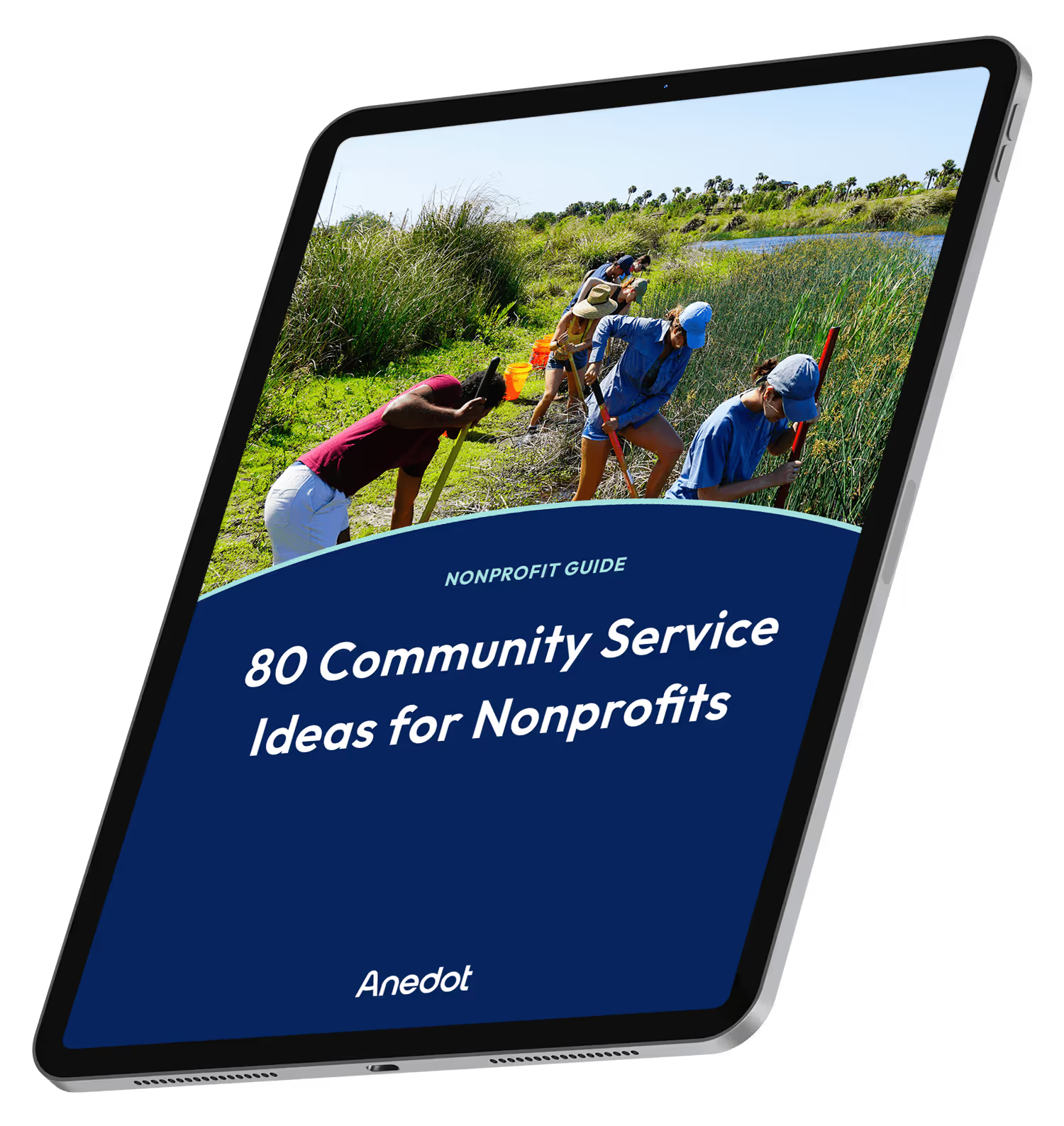
80 Community Service Ideas for Nonprofits

